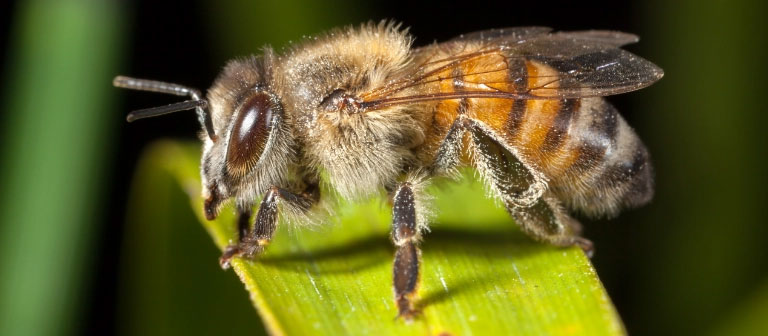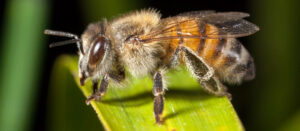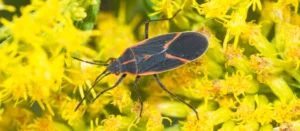$50 OFF New Residential Customers. Learn more
Killer Bees in Arizona? Understanding Africanized Bees and How to Coexist Safely

You’ve likely heard the term “killer bees” used to describe Africanized bees in Arizona, but did you know this nickname isn’t quite accurate? Africanized bees, while more aggressive than their European cousins, don’t actually seek out humans to harm. They only become aggressive when defending their hive. Given their high numbers in Arizona, understanding these bees and knowing how to safely coexist with them is crucial for residents. We serve the entire Phoenix area from our offices in Gilbert and Phoenix, including Glendale, Mesa, and Tempe. Contact us for a free estimate!
What Are Africanized Bees?
Africanized bees in Arizona are hybrids of African and European honeybee subspecies. Created in the 1950s by Brazilian scientists to improve honey production, some escaped captivity and spread rapidly across the Americas, reaching the U.S. decades ago.
These bees look similar to regular honeybees but display significantly more defensive behaviors. Most honeybees in Arizona now have some level of Africanized genetics. The higher the African DNA percentage, the more aggressive the bees tend to be.
Where Do Africanized Bees Nest?
In Arizona, Africanized bees thrive due to their remarkable adaptability. Unlike their European counterparts, they’re not picky about nesting sites, hives, and can often settle near human activity. Common nesting spots include water meter boxes, utility poles, cement blocks, debris piles, house eaves, overturned flowerpots, old tires, and even abandoned buildings. Because of their flexibility, accidental encounters with hives are increasingly common.
How Are Africanized Bees Different?
Key differences between Africanized and European honeybees include:
- Size: Slightly smaller, but the difference is subtle.
- Defensiveness: More reactive and quicker to defend their hive with larger numbers of guard bees.
- Swarming: Swarm more frequently, typically every 6-8 weeks versus the European bees’ 1-2 times per year.
- Colony Size: Smaller colonies averaging around 40,000 bees compared to European colonies of up to 60,000.
- Foraging: Begin foraging at younger ages, collecting more pollen to support rapid colony growth.
- Migration and Absconding: More likely to abandon and relocate their hives due to stress or seasonal changes.
The Potential Dangers
Africanized bees in Arizona are genuinely a safety concern due to their heightened defensiveness. Common activities like mowing the lawn or using power tools can inadvertently disturb them. Once provoked, these bees may pursue a perceived threat for up to a quarter-mile, delivering numerous stings. Although their venom isn’t more toxic than typical honeybee venom, the volume of stings can cause severe health issues and, rarely, fatalities.
Several incidents underscore this risk. A landscaper in Gilbert was stung approximately 300 times, and tragically, a golf course worker near Tucson lost his life after a swarm attack. Pets and livestock also face danger, as these bees aggressively protect their colonies against all threats.
Protecting Bees and Your Family
Bees are essential pollinators critical to Arizona’s ecosystem and food supply. However, when they nest too close to homes, the situation becomes a delicate balance between protecting these valuable insects and ensuring human safety. Blue Sky Pest Control specializes in achieving this balance, providing safe and effective bee management solutions.
How To Avoid Encounters With Africanized Bees
Preventative steps you can take:
- Regularly inspect your home and yard for bee activity.
- Seal cracks or holes that bees could enter.
- Clear clutter and potential nesting sites like unused flowerpots or old tires.
- Avoid strong fragrances outdoors, as these can attract bees.
What To Do If You Encounter a Beehive
- Maintain your distance.
- Move away slowly without sudden movements.
- Avoid loud noises and vibrations.
- Never swat at bees.
- Keep pets and children safely supervised.
- Immediately contact a professional pest control service for safe hive removal.
In Case of an Attack
- Quickly run to shelter, such as a vehicle or building.
- Protect your head and face as you flee.
- Remove stingers promptly by scraping them away with a credit card or fingernail.
- Seek immediate medical attention if allergic reactions occur or after numerous stings.
Keeping Arizona Safe, Together
While encounters with Africanized bees are rare, staying informed and taking precautionary measures are vital. At Blue Sky Pest Control, we understand the importance of protecting both your family and Arizona’s essential pollinators. With our expert help, you can enjoy peace of mind while responsibly managing bee populations near your home.
Related Posts

Killer Bees in Arizona? Understanding Africanized Bees and How to Coexist Safely
You’ve likely heard the term “killer bees” used to describe Africanized bees in Arizona, but did you know this nickname…

Red & Black Intruders: Meet Arizona’s Boxelder Bugs
Boxelder Bugs in Arizona If you’ve ever stepped outside and spotted a cluster of black-and-red bugs crawling on your porch…

Jumping Spiders in Arizona: Harmless or Hazardous?
Jumping spiders in Arizona might be small, but they can sure give you a big surprise when they suddenly appear…